The algae extracts market is estimated to be valued at USD 6.2 billion in 2025 and is projected to reach USD 12.5 billion by 2035, registering a compound annual growth rate (CAGR) of 7.2% over the forecast period. The market is projected to generate an incremental gain of USD 2.6 billion over the first five years, which represents 41.6% of the total incremental growth over the 10-year forecast period. The growth is driven by the increasing use of algae extracts in food, beverages, nutraceuticals, cosmetics, and agriculture. Demand is also rising for algae-based biofuels and sustainable products.
The market will benefit from advances in algae cultivation technologies and a growing preference for plant-based, eco-friendly ingredients. The second half (2030–2035) will contribute USD 3.1 billion, representing 58.4% of the total growth, as demand expands across a wide range of applications. Annual increments average USD 0.5 billion per year in the first phase, with stronger growth in later years driven by increased investments in sustainable and natural ingredients. Manufacturers focusing on scalability, product diversification, and cost-effectiveness will capture the largest share of this USD 5.9 billion opportunity.
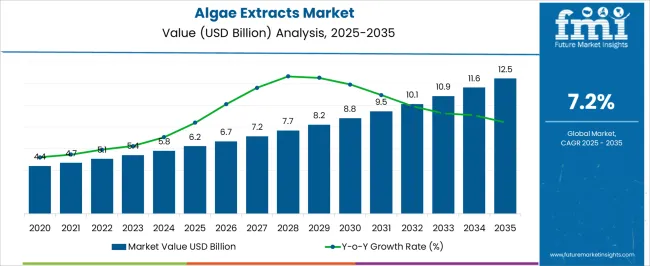
| Metric | Value |
|---|---|
| Algae Extracts Market Estimated Value in (2025 E) | USD 6.2 billion |
| Algae Extracts Market Forecast Value in (2035 F) | USD 12.5 billion |
| Forecast CAGR (2025 to 2035) | 7.2% |
Increasing consumer preference for clean-label products and plant-based alternatives has contributed to the growing adoption of algae-derived extracts. Industry news and investor communications from bio-ingredient manufacturers have highlighted the functional versatility of algae extracts in offering antioxidant, antimicrobial, and nutritional benefits.
These extracts are increasingly being incorporated into food, cosmetics, pharmaceuticals, and nutraceuticals due to their bioactive compounds and environmentally friendly production processes. Market outlook remains favorable as algae cultivation practices continue to evolve through advancements in biotechnology, reducing production costs and improving yield efficiency.
Industry-led initiatives and partnerships in circular bioeconomy models are further supporting algae-based innovation pipelines. As sustainability becomes a central pillar of product development, algae extracts are expected to become a core ingredient category across both mature and emerging markets, driving consistent growth over the coming years.
The algae extracts market is segmented by source, form, application, and geographic regions. By source, the algae extracts market is divided into Brown Algae, Red Algae, Green Algae, and Others. In terms of form, the algae extracts market is classified into Liquid and Solid. Based on application, the algae extracts market is segmented into Food and Beverages, Personal Care, Pharmaceuticals & Nutraceuticals, Animal Feed, and Others.
Regionally, the algae extracts industry is classified into North America, Latin America, Western Europe, Eastern Europe, Balkan & Baltic Countries, Russia & Belarus, Central Asia, East Asia, South Asia & Pacific, and the Middle East & Africa.
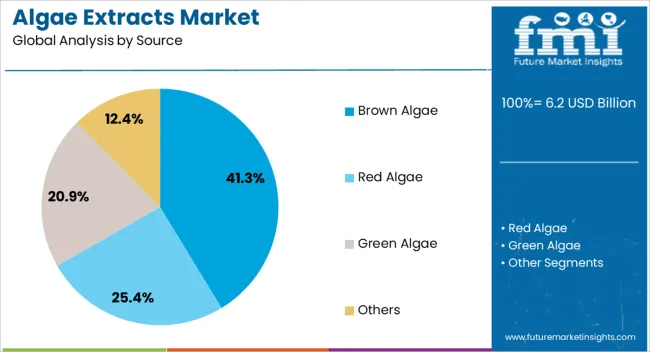
The brown algae segment is expected to hold 41.3% of the Algae Extracts market revenue share in 2025, positioning it as the leading source segment. This leadership is attributed to the high concentration of fucoidans, alginates, and other bioactive compounds found in brown algae, which have gained widespread recognition for their functional benefits.
Product innovation updates and technical literature have identified brown algae as highly effective in delivering antioxidant and anti-inflammatory properties, making them suitable for a wide range of applications, including functional foods, skincare, and pharmaceuticals. Their abundance and ease of harvesting in marine environments have contributed to stable supply chains and cost efficiency.
Furthermore, advancements in extraction technologies have enhanced the scalability and purity of brown algae extracts, reinforcing their commercial viabilit.y These factors have made brown algae the preferred raw material source for manufacturers seeking high-yield, multi-functional extract options, leading to its dominant share in the market.
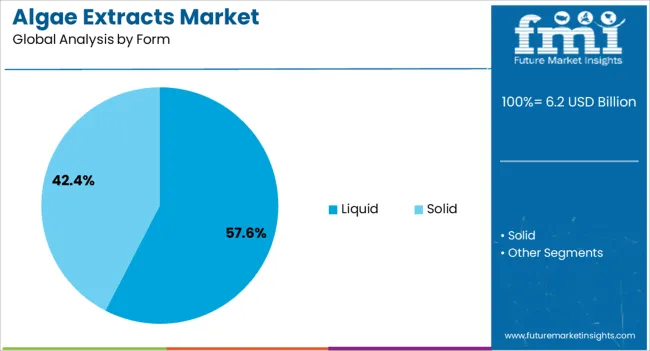
The liquid form segment is projected to account for 57.6% of the Algae Extracts market revenue share in 2025, making it the dominant formulation. This leading position has been driven by the liquid format’s higher solubility, ease of incorporation into various end-use formulations, and enhanced bioavailability of active compounds.
Technical datasheets and product usage guides have shown that liquid extracts offer greater formulation flexibility in beverages, serums, and nutraceutical products. Additionally, manufacturers have increasingly favored liquid extracts for their consistent dosing accuracy and ease of blending, which aligns with automated production systems.
The segment’s strength is also supported by the growing use of algae in liquid dietary supplements and fortified beverages, as reported in press releases by health and wellness brands. These functional and logistical advantages have led to strong adoption rates across commercial manufacturing, resulting in the liquid segment’s top position in 2025.
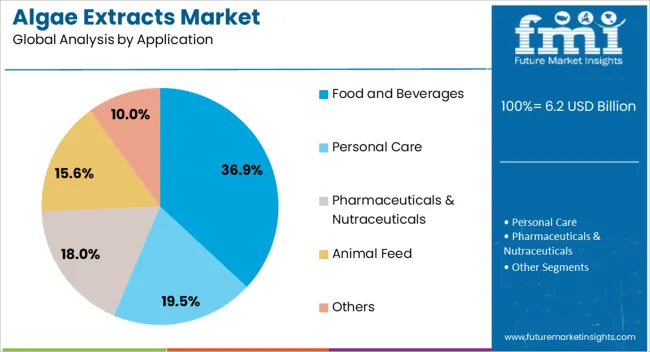
The food and beverages application segment is projected to represent 36.9% of the Algae Extracts market revenue share in 2025, maintaining its leadership position. This growth is being supported by rising consumer demand for plant-based, nutrient-rich ingredients that offer health benefits beyond basic nutrition.
Company press statements and industry news sources have reported that algae extracts are being widely utilized in functional beverages, snacks, and fortified foods due to their high protein content, omega fatty acids, and micronutrient profile. Food producers have been adopting algae-based formulations to meet clean-label requirements and to differentiate product offerings in increasingly competitive categories.
The segment has further benefited from regulatory approvals and safety validations for algae-derived ingredients in global markets. These trends, coupled with algae’s ability to meet both taste and health optimization criteria, have ensured the food and beverages segment remains the leading application area for algae extracts in 2025.
The algae extracts market is driven by increasing demand for natural ingredients in nutraceuticals and cosmetics. Opportunities in expanding applications and emerging trends in algae-based superfoods and personal care products are shaping the market. However, high extraction costs and raw material availability remain significant barriers. By 2025, overcoming these challenges with more efficient production methods and sustainable sourcing will be key to continued market growth.
The algae extracts market is growing due to the increasing demand for natural and functional ingredients in food, beverages, and cosmetics. Algae extracts are recognized for their antioxidant, anti-inflammatory, and hydrating properties, making them popular in skincare and dietary supplements. As consumers seek cleaner, plant-based ingredients, the market for algae extracts continues to expand. By 2025, this demand will continue to rise, driven by the growing trend for clean-label, functional food and beauty products.
Opportunities in the algae extracts market are increasing with the growing use of these extracts in nutraceutical and cosmetics applications. Algae-based ingredients are being used in supplements to promote overall health, such as boosting immunity or improving skin health. In cosmetics, algae extracts are utilized for their moisturizing, anti-aging, and skin-soothing properties. By 2025, the expanding demand for algae in these sectors will create significant growth opportunities, particularly as consumer preferences shift toward more natural and plant-derived ingredients.
Emerging trends in the algae extracts market include the rise of algae-based superfoods and personal care products. As the popularity of plant-based diets grows, algae extracts are increasingly being incorporated into superfoods such as spirulina and chlorella, known for their high protein and nutrient content. In personal care, algae is gaining traction in formulations for skin and hair care, addressing issues such as hydration and scalp health. By 2025, these trends will continue to drive demand in both food and beauty industries.
Despite growth, challenges related to high extraction costs and raw material availability persist in the algae extracts market. Extracting high-quality algae in large quantities requires specialized equipment and significant investment, making it a costly process. Furthermore, the availability of algae, especially certain high-demand species, can be limited by environmental factors or supply chain disruptions. By 2025, addressing these challenges through cost-effective extraction methods and better sourcing strategies will be essential for ensuring consistent market supply.
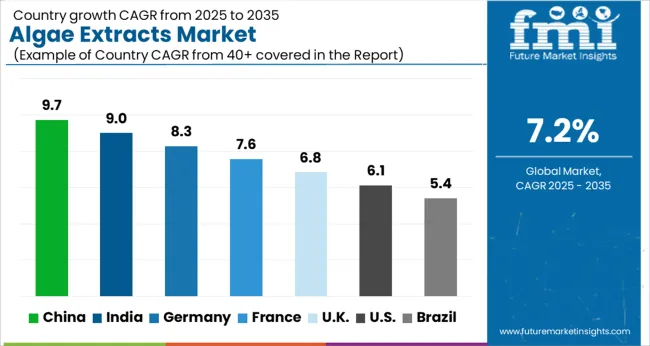
The global algae extracts market is projected to grow at a 7.2% CAGR from 2025 to 2035. China leads with a growth rate of 9.7%, followed by India at 9%, and France at 7.6%. The United Kingdom records a growth rate of 6.8%, while the United States shows the slowest growth at 6.1%. These varying growth rates are driven by factors such as increasing demand for natural and plant-based ingredients in the food, cosmetics, and pharmaceutical industries, as well as the growing trend towards sustainability. Emerging markets like China and India are experiencing higher growth due to the rising consumer demand for functional and organic ingredients, while more mature markets like the USA and the UK see steady growth driven by innovations in algae extraction technologies and a strong preference for natural products. This report includes insights on 40+ countries; the top markets are shown here for reference.
The algae extracts market in China is growing rapidly, with a projected CAGR of 9.7%. The country’s increasing demand for natural, sustainable, and functional ingredients in industries such as food and beverage, cosmetics, and pharmaceuticals is driving the adoption of algae extracts. The growing consumer preference for plant-based, organic products, coupled with China’s expanding wellness and skincare industries, further fuels market growth. Additionally, China’s increasing focus on sustainability, green technology, and eco-friendly products is contributing to the growing demand for algae extracts in various applications.
The algae extracts market in India is projected to grow at a CAGR of 9%. India’s expanding food and beverage, cosmetics, and pharmaceutical industries are key drivers of demand for algae extracts. The country’s increasing health-conscious population, along with the growing interest in plant-based and functional ingredients, is fueling the demand for algae-based products. Additionally, India’s growing interest in sustainable sourcing and natural ingredients, coupled with the rise of organic and wellness-focused consumer products, is contributing to the market’s growth.
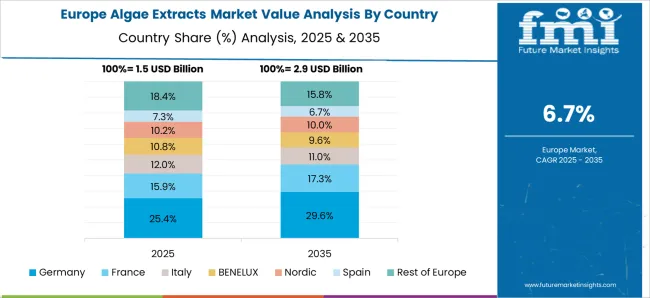
The algae extracts market in France is projected to grow at a CAGR of 7.6%. France’s strong demand for natural, organic, and functional ingredients in the food, beverage, and cosmetics sectors is driving steady growth in the algae extracts market. The country’s increasing preference for sustainable products, coupled with rising awareness of the benefits of algae-based ingredients, further supports market expansion. Additionally, France’s growing interest in plant-based diets, eco-conscious consumer behavior, and the rising demand for natural skincare solutions are contributing to the widespread adoption of algae extracts.
The algae extracts market in the United Kingdom is projected to grow at a CAGR of 6.8%. The UK market is driven by the growing consumer preference for natural and sustainable ingredients in beauty, skincare, and food products. The rise in eco-conscious consumer behavior, combined with the increasing demand for functional and plant-based ingredients, is fueling the market for algae extracts. Additionally, the UK’s focus on sustainability and the growing adoption of algae-based ingredients in clean-label and organic products is contributing to the steady expansion of the market.
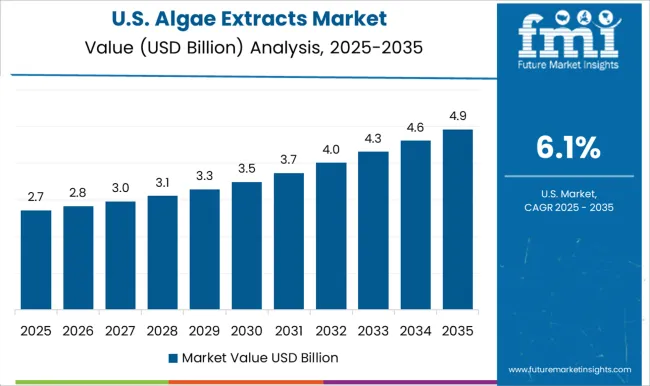
The algae extracts market in the United States is expected to grow at a CAGR of 6.1%. The USA market remains steady, driven by rising consumer demand for natural, organic ingredients in personal care, food, and beverage products. The increasing trend towards sustainability and clean-label products is contributing to the adoption of algae extracts. Additionally, the USA market is benefiting from the growing interest in plant-based ingredients and the rise of eco-conscious and wellness-focused consumer products, further supporting the demand for algae extracts in various sectors.
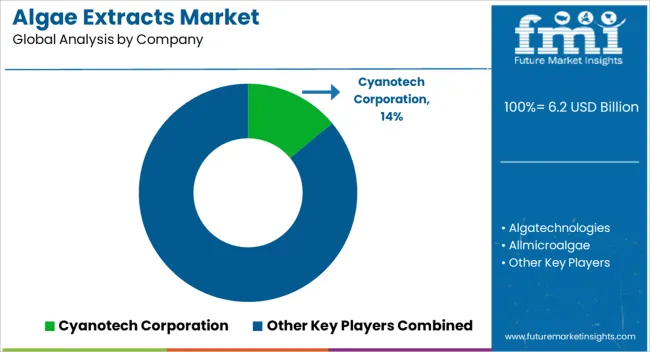
Cyanotech Corporation leads with commercial astaxanthin and spirulina lines used in capsules, powders, beverages, and functional foods. Solabia Algatech Nutrition, formerly Algatechnologies, supplies natural astaxanthin from Haematococcus pluvialis for nutrition and beauty formats. Corbion N.V. provides microalgae-based lipids such as DHA for food and feed enrichment. Earthrise Nutritionals LLC delivers spirulina powders and phycocyanin natural blue for confectionery and beverages.
Olmix Group develops seaweed extracts for animal nutrition and crop care, supporting feed additives and biostimulant uses. Phycom B.V. operates industrial microalgae production for food-grade ingredients and blends. Tagrow Co., Ltd. supplies seaweed-derived extracts for agricultural formulations. Growth has been driven by cleaner label positioning, pigment and antioxidant demand, and broadened applications in gummies, gels, ready-to-drink formats, aquafeed enrichment, and crop inputs, while scale-up, cost efficiency, and consistent quality remain decisive differentiation factors.
| Item | Value |
|---|---|
| Quantitative Units | USD 6.2 Billion |
| Source | Brown Algae, Red Algae, Green Algae, and Others |
| Form | Liquid and Solid |
| Application | Food and Beverages, Personal Care, Pharmaceuticals & Nutraceuticals, Animal Feed, and Others |
| Regions Covered | North America, Europe, Asia-Pacific, Latin America, Middle East & Africa |
| Country Covered | United States, Canada, Germany, France, United Kingdom, China, Japan, India, Brazil, South Africa |
| Key Companies Profiled | Cyanotech Corporation, Algatechnologies, Allmicroalgae, Arizona Algae Products, LLC., Blue Evolution, Corbion NV, Earthrise Nutritionals LLC. (DIC Corporation), Goerlich Pharma GmbH, Kelp, Olmix Group, Phycom Microalgae, Phytoalgae, Solazyme, Tagrow Co., Ltd, and Texas A&M AgriLife Research |
| Additional Attributes | Dollar sales by extract type and application, demand dynamics across food and beverage, cosmetics, and pharmaceuticals sectors, regional trends in algae extract adoption, innovation in extraction methods and functional properties, impact of regulatory standards on safety and sustainability, and emerging use cases in nutraceuticals and eco-friendly personal care products. |
The global algae extracts market is estimated to be valued at USD 6.2 billion in 2025.
The market size for the algae extracts market is projected to reach USD 12.5 billion by 2035.
The algae extracts market is expected to grow at a 7.2% CAGR between 2025 and 2035.
The key product types in algae extracts market are brown algae, red algae, green algae and others.
In terms of form, liquid segment to command 57.6% share in the algae extracts market in 2025.






Full Research Suite comprises of:
Market outlook & trends analysis
Interviews & case studies
Strategic recommendations
Vendor profiles & capabilities analysis
5-year forecasts
8 regions and 60+ country-level data splits
Market segment data splits
12 months of continuous data updates
DELIVERED AS:
PDF EXCEL ONLINE
Algae Treatment Chemical Market Forecast and Outlook 2025 to 2035
Algae-Based Eco-Pigments Market Size and Share Forecast Outlook 2025 to 2035
Algae-Based Anti-Aging Products Market Analysis - Size, Share, and Forecast Outlook 2025 to 2035
Algae-based Ingredients Market Size and Share Forecast Outlook 2025 to 2035
Algae-Based Emollients Market Analysis - Size and Share Forecast Outlook 2025 to 2035
Algae Biofuel Prospects Market Size and Share Forecast Outlook 2025 to 2035
Algae Omega Market Analysis - Size, Share, and Forecast Outlook 2025 to 2035
Algae Products Market Analysis - Size, Share, and Forecast Outlook 2025 to 2035
Algae-based Supplement Market Analysis - Size, Share, and Forecast Outlook 2025 to 2035
Algae Oil Market Analysis - Size, Share, and Forecast Outlook 2025 to 2035
Algae-based Animal Feed Market Growth, Trends and Forecast from 2025 to 2035
Evaluating Algae Omega Market Share & Key Manufacturers
Algaecides Market Assessment and Forecast for 2025 to 2035
Algae-based food additive market analysis by product type, source, functionality, application and by region growth, trends and forecast from 2025 to 2035
Algae Fats Market Trends - Sustainable Fat Innovations 2025 to 2035
Algae Proteins Market Trends – Sustainable Nutrition & Market Growth 2025 to 2035
Evaluating Algae-Based Bioplastics Market Share & Provider Insights
Market Share Breakdown of Algae Ink Industry
Market Share Breakdown of Algae-Based Packaging Companies
Algae-Based Bioplastics Market Analysis – Growth & Forecast 2024-2034

Thank you!
You will receive an email from our Business Development Manager. Please be sure to check your SPAM/JUNK folder too.
Chat With
MaRIA